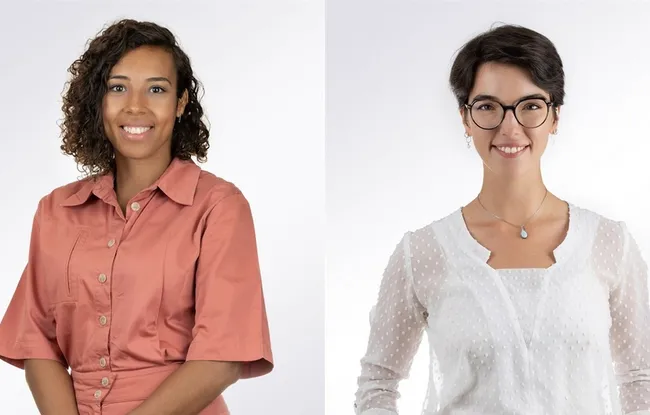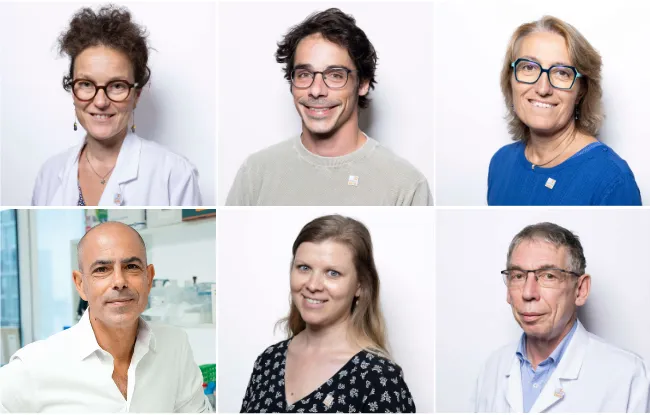- Home >
- Institut Curie News >
- L’Oréal Foundation’s Young Talents award : Two Institut Curie researchers awarded
Achieving gender equality within and at the head of our laboratories is a priority for Institut Curie. We need to cultivate Marie Curie’s scientific and cultural heritage. Sincere congratulations to Meryem Baghdadi and Victoire Cachoux! They are the embodiment of the talented and committed women who raise the profile of science within our institute and beyond.
declares Prof. Alain Puisieux, Director of Institut Curie Research Center.
Among the 35 winners in 2022:
Meryem Baghdadi, young CNRS Resaerch Fellows in the Cell migration and invasion team led by Danijela Matic Vignjevic (CNRS UMR144 / Sorbonne University)
Victoire Cachoux, jyoung scientific doctor ine the Polarity, division et morphogenesis team led by Yohanns Bellaïche (CNRS UMR3215 / Inserm U934 / Sorbonne University)
I warmly congratulate Meryem Baghdadi and Victoire Cachoux for this beautiful award, and beyond that, all the laureates and all the women who are committed to science to make it ever more beautiful, creative and free. Today, the stakes are so high in the fields of health, environment, food, energy... that we must be united and numerous to face these challenges
Prof. Edith Heard, laureate of the 2020 L'Oréal-Unesco International Prize for Women and Science, General Director of the European Molecular Biology Laboratory (EMBL), Professor at the Collège de France, former Director of the Genetics and Developmental Biology Unit (CNRS UMR3215 / Inserm U934 / Sorbonne University) and President of the International Scientific Council of the Institut Curie.
Cross interview with the laureates
► What are your research themes?
Meryem Baghdadi: My passion for stem cells emerged during my Master’s degree “Stem cells and cancer” at Pierre and Marie Curie University, and it’s been with me ever since, during my thesis at Institut Pasteur, my post-doctoral fellowship in Canada and until now, at Institut Curie. How do stem cells deal with their environment? How do they react to physical constraints? How can these interactions lead to diseases such as dystrophy, Crohn’s disease and cancer? Today I am trying to identify and decipher the signals related to the mechanical constraints perceived by stem cells in the intestinal epithelium and that are involved in carcinogenesis.
Victoire Cachoux: I’m not a biologist; I majored in engineering at the Ecole Polytechnique where I studied mathematics, computer science and physics. My classes there introduced me to developmental biology and I was fascinated by the connections between biology and math or physics. In 2018 I began my thesis at Institut Curie and my investigation topic was understanding the biophysical factors that control programmed epithelial cell death (or apoptosis). Why, in cancer, do the cells that are supposed to die do not so? Through the analysis of extremely precious quantitative data, statistics and machine learning, we demonstrated for the first time that certain characteristics, in particular related to size and geometry, induce cell death and help us predict apoptosis in the tissues at a very early stage.
► Which successes are you particularly proud of?
Meryem Baghdadi: I like to test new concepts and shake things up. During my thesis for example, I published an article in Nature in which my colleagues and I showed for the first time that a collagen protein could attach to a hormone receptor and was capable of inducing a signaling pathway. Nobody had demonstrated that before! I also revealed a dialog between the stem cells and the enteric nervous system in the intestinal epithelium. These scientific challenges fascinate me and convince me that nothing is impossible.
Victoire Cachoux: Quite early on during my thesis, within our team we found that cell size seemed to play a role in cell death but we did not understand by which genetic signaling mechanism. I always question my results, it takes a while for me to be convinced, but one day we had the proof when testing a gene in particular, and that was a great moment! And then during the 4 years of my thesis - 2 of which were during Covid - I had not attended many conferences but then in early January 2022 I presented my work orally and I received an award; it was very encouraging and satisfying.
► Women in science: what are your impressions and observations, what challenges are there?
Meryem Baghdadi: Women are better represented in biology than in many other scientific disciplines. Access to science is relatively easy for them but the challenge is to remain there and to access the top jobs. Of all the institutions in which I have worked, Institut Curie is by far the one with the most women unit directors. And scientific excellence can be achieved only through the very broadest diversity of thought and action. Many women inspire me - my mother above all - including iconic researchers: Marie Curie of course, Edith Heard in Germany, Elaine Fuchs in the USA... it’s partly thanks to them that I aspire, one day, to lead my own research team, and even laboratory.
Victoire Cachoux: Throughout my studies I experienced very different situations that were not always easy to manage. At Ecole Polytechnique women were in the minority - 70 out of a class of 500. At the national and international level, the higher up you go in scientific research, the fewer women you see. Particularly in math, statistics and physics, the numbers are shocking. However, since I’ve been at Institut Curie, the atmosphere is a lot more egalitarian and I have met a lot of women, at all stages in their career, including in management positions. It is very inspiring.
► What does this award mean to you?
Meryem Baghdadi: I am very proud to receive this wonderful award. It is a true recognition of my work and my commitment. This award gives me true independence in my career to attend trainings and meetings. It is also connected to what I want to do, which is to promote and encourage women to stay in science and share their experiences. At the University of Poitiers, I had the opportunity to talk to young people to encourage them to enter scientific careers. I will use this award to repeat and pursue this experience on a larger scale. The L’Oréal foundation organizes talks for high school girls to encourage them to choose science but also to raise awareness among the boys involved in the process so that it becomes the norm.
Victoire Cachoux: I am delighted that my hybrid background caught the interest of the jury; it’s a great achievement for interdisciplinary research and a wonderful surprise. This award will bring me a network of young women scientists with whom we can work closely, including in disciplines that I’m not familiar with; we are going to take a leadership and management training. I will be able to attend training that is truly useful to my career, and in particular I’ll be able to study ethical issues related to artificial intelligence. We need support at all levels so that France produces great science that serves society. The fact that women censor themselves or do not remain in science deprives us of much talent. Mathematically speaking, if we exclude half the population we exclude half the talent.
|
L'Oréal-Unesco Awards The L'Oréal Foundation coordinates 52 national and regional programmes, providing 250 grants per year to doctoral and post-doctoral students in more than 110 countries. The laureates - 35 in France - are selected from thousands of applications by nearly 400 international scientists. |





